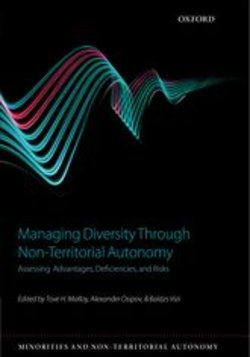ECMI Publications Database

Non-territorial autonomy (NTA) is a statecraft tool gaining increasing importance in societies that are seeking to accommodate demands by ethno-cultural groups for a voice in cultural affairs important to the protection and preservation of their identity, such as language and education, as well as religion. NTA offers policymakers a range of options for institutional design adaptable to specific circumstances and historical legacies. It devolves degrees of power through legal frameworks and institutions in specific areas of ethno-cultural life, while maintaining social unity at the core level of society. Throughout Europe and North America, NTA exists and is implemented at state, regional, and local levels. The book carves out a space for contextual knowledge production on NTA in law and the social and political sciences. What are the institutions, bodies, and functions that ethno-cultural groups can draw on when seeking to have a voice in their own affairs, as well as over issues in society related to their identity production? How are these entities incorporated and empowered to have a voice? What degree of voice do they have, and how are they designed to project the voice? Thus, contextual knowledge also involves critical assessment and risk analyses as well as penetrating insights as to the unintended consequences and hidden agendas that may inform NTA policies.
The volume includes 11 academic articles and is edited by Prof. Dr. Tove H. Malloy (Director, European Centre for Minority Issues), Dr. Alexander Osipov (Senior Research Associate, European Centre for Minority Issues), and Dr. Balázs Vizi (Senior Research Fellow, Institute for Minority Studies, Centre for Social Sciences, Hungarian Academy of Sciences).
The volume includes 11 academic articles and is edited by Prof. Dr. Tove H. Malloy (Director, European Centre for Minority Issues), Dr. Alexander Osipov (Senior Research Associate, European Centre for Minority Issues), and Dr. Balázs Vizi (Senior Research Fellow, Institute for Minority Studies, Centre for Social Sciences, Hungarian Academy of Sciences).

